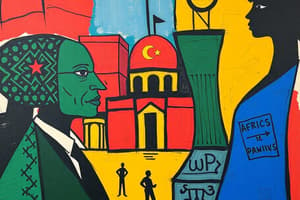Podcast
Questions and Answers
What was the primary purpose of the Berlin Conference?
What was the primary purpose of the Berlin Conference?
To establish rules for the colonization and partitioning of Africa among European powers.
Who was the primary organizer of the Berlin Conference?
Who was the primary organizer of the Berlin Conference?
Otto von Bismarck of Germany.
How did the Berlin Conference affect the Congo?
How did the Berlin Conference affect the Congo?
It legitimized King Leopold II's claim to the Congo Free State as his personal property.
What characterized the colonization of the Congo Free State under King Leopold II?
What characterized the colonization of the Congo Free State under King Leopold II?
In what way was the Berlin Conference relevant to British colonization of India?
In what way was the Berlin Conference relevant to British colonization of India?
What was the outcome of the Berlin Conference in terms of African territories?
What was the outcome of the Berlin Conference in terms of African territories?
What did King Leopold II claim was his mission in the Congo?
What did King Leopold II claim was his mission in the Congo?
How did the Berlin Conference influence future European colonization practices?
How did the Berlin Conference influence future European colonization practices?
What was a key difference between the British colonization of India and the division of Africa as seen in the Berlin Conference?
What was a key difference between the British colonization of India and the division of Africa as seen in the Berlin Conference?
How did the Berlin Conference exemplify the practice of imperialism?
How did the Berlin Conference exemplify the practice of imperialism?
In what ways did the colonial strategies in the Congo differ from those in India?
In what ways did the colonial strategies in the Congo differ from those in India?
What was one of the main goals of European powers during the 19th century as shown through the Berlin Conference?
What was one of the main goals of European powers during the 19th century as shown through the Berlin Conference?
What does the term imperialism refer to in the context of the Berlin Conference?
What does the term imperialism refer to in the context of the Berlin Conference?
What framework for colonization was formalized by the Berlin Conference?
What framework for colonization was formalized by the Berlin Conference?
How did the strategies employed in Africa and India reflect European imperialist ambitions?
How did the strategies employed in Africa and India reflect European imperialist ambitions?
What impact did European imperialism have on territories like the Congo and India?
What impact did European imperialism have on territories like the Congo and India?
Study Notes
The Berlin Conference and its Impact on Colonization
- The Berlin Conference was held in 1884-1885 by European powers, led by Otto von Bismarck of Germany, to establish rules for colonizing and dividing Africa.
- The conference aimed to prevent conflict between European nations by setting a framework for how to partition Africa, a continent with significant resources.
- The conference formalized the "Scramble for Africa", resulting in the division of the continent into European-controlled territories.
- The conference laid the groundwork for exploiting African land and resources, often ignoring existing boundaries and creating long-lasting effects on African societies.
The Berlin Conference and the Congo
- The Berlin Conference directly impacted the Congo by recognizing King Leopold II of Belgium's claim to the Congo Free State as his personal property.
- Leopold presented to the European powers a "civilizing mission" for the Congo Free State, aimed at improving African lives.
- The Congo Free State became a brutal example of exploitative colonization under Leopold II, where forced labor, violence, and human rights abuses were rampant as he extracted rubber and ivory.
- The recognition of Leopold's claim over the Congo legitimized the exploitation and colonization of African territories by European powers, setting a precedent for other colonies and the use of direct rule to extract resources for European benefit.
The Berlin Conference and India
- While the Berlin Conference focused on Africa, it is relevant to understand the broader context of European imperialism and colonization in regions like India.
- The British Empire already had a significant presence in India when the Berlin Conference took place, with direct British rule established after the Indian Rebellion of 1857.
- The Berlin Conference showcased how European powers sought to expand and formalize their empires using diplomacy, strategic agreements, and colonization, similar to their actions in Africa.
- The British colonization of India was not shaped by a similar conference, but both cases highlight European imperial strategies to control territories, extract resources, and establish political dominance.
The Berlin Conference and Imperialism
- The Berlin Conference exemplifies the global scale of European imperialism.
- Imperialism is the practice of extending a country’s power and influence through colonization, military force, or economic control.
- The Berlin Conference shows how imperialist powers collaborated to divide and conquer regions for economic and political gain.
- While the Congo faced harsh direct rule and resource exploitation under the Berlin Conference's framework, India was under British control through a mix of indirect and direct rule.
- Both cases reflect the various methods employed by European powers to maintain control over their colonies.
The Berlin Conference: A Turning Point
- The Berlin Conference formalized the partitioning of Africa and provided European powers with a framework for colonization, leading to exploitative rule in places like the Congo.
- It embodies the imperialist mindset of European powers during the 19th century, focusing on territorial expansion and resource extraction, similar to their actions in India.
- The conference marks the zenith of European imperialist ambition, demonstrating how colonization was driven by competition for global dominance, resource control, and political power.
Studying That Suits You
Use AI to generate personalized quizzes and flashcards to suit your learning preferences.
Related Documents
Description
Explore the significance of the Berlin Conference of 1884-1885, which set the stage for the division of Africa among European powers. This quiz delves into the impact of colonial policies on African societies, including the notable case of the Congo under King Leopold II. Test your knowledge of historical events that shaped modern Africa.




